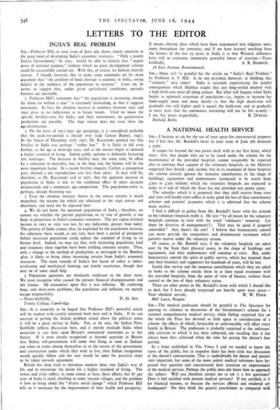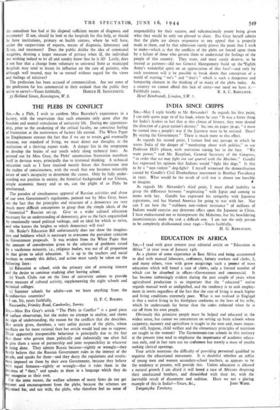Sus,—The medical profession should be grateful to The Spectator for
opening its columns to discussion of the Government's scheme for a national comprehensive medical service, while feeling surprised that on the whole the Press has devoted so little space to consideration of a scheme the effects of which, favourable or unfavourable, will affect every family in Britain. The profession is probably surprised at the unfavour- able criticism to which it has been subjected, not recalling that it has always been thus criticised when the time for paying the doctor's fees arrived.
In a letter published in The Times I said we -needed to know the views of the public, but in response there has been little but discussion of the doctor's remuneration. That is undoubtedly for doctor• and patient very important, but some of the more ardent medical reformers have by- passed that question and concentrated their attention on improvement of the medical services. Perhaps the public does not know how to approach the subject. Will you therefore permit me to ask it a few questions? Does it feel satisfied with present medical services? If not satisfied, is it for financial reasons, or because the services offered and rendered are inadequate? Do they think the general- practitioner as compared with the consultant has had at his disposal sufficient means of diagnosis and treatment? If not, should he look to the hospitals for this help, or should he have institutions, primary or_ health centres, where he will have, under the surpervision of experts, means of diagnosis, laboratory and X-ray, and treatment? Does the public dislike the idea of communal surgeries, desiring a larger measure of privacy when ill, the individual not wishing indeed to let all and sundry know that he is ill? Lastly, does it not fear that a change from voluntary to universal State or municipal hospitals may tend to lessen its influence on the care of patients, who although well treated, may be so treated without regard for the views and feelings of relatives?
The profession has been accused of commercialism. Are not some of the profession far less commercial in their outlook than the public they
strive to serve?—Yours faithfully, , HAROLD H. SANGUINETTI. 35 Holland Street, Kensington; W. 8.



























 Previous page
Previous page